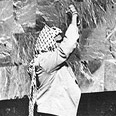
Rewarding terror
Terrorism continues because terrorism works
Winning World War IV requires de-legitimizing terrorism. But terrorism today is a thriving enterprise because for at least three decades, terrorists have been rewarded. Republicans and Democrats alike have been responsible for this error. Europeans even more so.
Almost exactly 32 years ago, Palestinian terrorists entered the Olympic Village in Munich and massacred 11 innocent Israeli athletes. That act of mass murder was not considered sufficiently serious to merit canceling the Olympic games – or even postponing them for a day.
The group responsible for the killings, the Palestine Liberation Organization, received more encouragement than condemnation. Two years later, PLO Chairman Yasser Arafat was invited to address the UN. The PLO was welcomed to the General Assembly and “the question of Palestine” was introduced into the agenda.
A few years later, Arafat won the Nobel Peace Prize. Abu Daoud – the unrepentant terrorist who planned the 1972 massacres – received the Palestinian Prize for Culture.
And everyone else in the world with grievances and complaints learned the rules: Terrorism is acceptable. Terrorism works. Terrorism succeeds – like nothing else. So why not use it?
Lawyers fighting terror?
Why not indeed? In the years prior to Sept. 11, to the extent that terrorists were pursued, it was less by soldiers, commandos and spies than by lawyers armed with subpoenas. Terrorists and their masters were seldom punished. There is a name for such policies, a name coined in the 1930’s: appeasement.
Clearly, we need new and better policies. Surely, the United States needs to develop intelligence and clandestine services capable of ferreting out terrorists wherever they hide, train and plot.
We in the United States must expand our now-tiny Special Forces, the component of the military machine best equipped to fight 21st century warfare.
A war of ideas must be fought as well. It must stop being socially acceptable to excuse terrorism (e.g., “One man’s terrorist is another man’s freedom fighter,” “They must be so desperate!”).
Yes, in the past terrorism was condoned many times in many places. But morality evolves. Not so long ago, genocide, slavery and piracy were also common practices. Does that mean that we should tolerate those evils forever, too?
Not merely crime, but mistake
Terrorism must come to be seen as not just a crime but a grievous blunder. It must be demonstrated repeatedly that it sets back the cause in whose name it is committed – no matter how righteous some people may believe that cause to be.
Ultimately, the extremist, supremacist, totalitarian ideologies championed by Osama bin Laden, Saddam Hussein, the Iranian mullahs and others must be seen to be a dead end, figuratively and literally.
Bin Laden famously said, “When people see a strong horse and a weak horse, they naturally choose the strong horse.” He understands the dynamics of public persuasion better than many State Department officials. It falls to America to spearhead the effort to prove that freedom and democracy are the strongest horses on the track.
Defeating Islamism
In the 20th century, America and its friends defeated both Communism and Nazism. There are still Communists and Nazis in the world, but their movements are weak and unappealing to all but a lunatic fringe.
In his fascinating bestseller, “The Case for Democracy,” former Soviet prisoner of Zion Natan Sharansky presents a well-argued case for the transformational power of freedom. He advocates supporting those who are fighting for human rights in parts of the world – not least the Middle East – where such concepts have not yet taken root.
According to Sharansky, the world is divided into two types of societies – free societies and “fear societies.”
Fear dominates Iran and Syria, and those parts of Lebanon that are still controlled by Syria. And no one would dare stand up in Ramallah or Gaza and say out loud that Yasser Arafat was corrupt, or that it’s time to negotiate a genuine and lasting peace with Israel.
Too many Arab regimes manufacture hatred, terrorism and excuses. Failures are never the faults of the dictator or the regime. They are always the fault of some demonic “other” – colonialists, “Crusaders,” Zionists, Americans, Israelis.
All this serves to pose again the question of whether the peoples of the Middle East are prepared to shoulder the considerable burdens and weighty responsibilities of freedom, democracy and human rights.
Most people on the left today think not. The paleo-conservatives and Buchananite Right agree with them.
Most Europeans believe that attempting to spread freedom in Arab lands makes as much sense as planting banana trees in Iceland.
Their alternative: stability. But consider the stability we’ve fostered by supporting the Saudi rulers or by not interfering with the Iranian ayatollahs – even after they kidnapped U.S. diplomats and enlisted Hizbullah to murder our marines and diplomats in Beirut.
Look at the stability France has reaped by dismissing as naïve every proposal for democratic reform in the Ivory Coast for the past 40 years. Recall the stability Saddam Hussein offered. Look at the stability the Israelis achieved for themselves by recalling Arafat from exile and installing him as ruler of the West Bank and Gaza.
There is a growing list of Arab and Muslim dissidents – advocates of freedom, democracy and human rights - who are as brave as were Sharansky, Andrei Sakharov, Vaclav Havel and other European dissidents in their day. Men like Tarek Heggey, Farid Ghadry, Akbar Ahmed and Omar Karsouo – to name just a few.
In the 1970s we chanted “Give peace a chance.” Perhaps the slogan of Muslim reformers – and those, like Sharansky, who support them – should be “Give freedom a chance.” Surely, it’s too soon to give up.
Clifford May, a former New York Times senior foreign correspondent and bureau chief in conflict zones such as Iran, Afghanistan and Yugoslavia, is the president of the Foundation for the Defense of Democracies, a policy institute focusing on terrorism.










